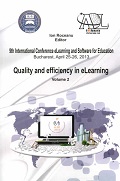CIVIC EDUCATION THROUGH ONLINE ENVIRONMENT: LEARNING ABOUT 2012 ROMANIAN ELECTIONS
CIVIC EDUCATION THROUGH ONLINE ENVIRONMENT: LEARNING ABOUT 2012 ROMANIAN ELECTIONS
Author(s): Monica PĂTRUȚSubject(s): Education
Published by: Carol I National Defence University Publishing House
Keywords: web 2.0; Civic education; elections; 2012; online learning
Summary/Abstract: Civic education has as main objective the preparing of active and capable citizens to contribute to the development and well-being of society. In order to achieve this objective there is a focus on the accomplishment of political literacy, on the development of critical thinking and analytical abilities, on the cultivation of democratic attitudes and values, and on the stimulation of active participation in community and society. The Strategic Framework for European Cooperation in the field of Education and Professional Development stipulates the promotion of civic education in order to consolidate the active citizenship and political participation. Civic education is compulsory in a world where changes take place rapidly, where diversity has become more and more salient and the necessity for the existence of active, informed and responsible citizens has become more pervasive than before. Civic education should be considered as a dimension of formal and informal education and this can be achieved in ways both traditional and modern and/or online and offline. The internet can be a good instrument to stimulate the political informing, the political participation or the citizens’ civic commitment. Web 2.0 provides to each citizen not only the possibility of getting informed, but also of generating/ producing and distributing content on political issues, of interacting/ collaborating with other citizens and of debating/ resolving different (inter)national problems. The citizen can easily get involved in the electronic agora, can get informed and can express his/ her own opinions and can contribute to the improvement of the political system performance. In this study we will analyze the way in which the online environment can help citizens document themselves in order to choose, being totally aware, the representatives of the national legislative forum and the types of public policies to be put into practice. We will provide a content analysis of the most well-known 2012 Romanian election and political platforms (www.openpolitics.ro, www.machiavelli.ro, www.alegericorecte.ro, votulmeu.com, www.hartapoliticii.ro, http://www.cineceapromis.ro, http://www.titools.ro/alegeri2012). Starting from the theoretical frameworks of Gibson & Ward, Foot & Schneider, Schweitzer &Lilleker, our study will address the following research questions: RQ1 – To what degree do the online election and political platforms contribute to the informing, connecting, involving and mobilizing of Romanian citizens? RQ2 – To what degree do the features of these platforms take into account the advantages provided by Web 2.0?
Journal: Conference proceedings of »eLearning and Software for Education« (eLSE)
- Issue Year: 9/2013
- Issue No: 02
- Page Range: 639-644
- Page Count: 6
- Language: English

